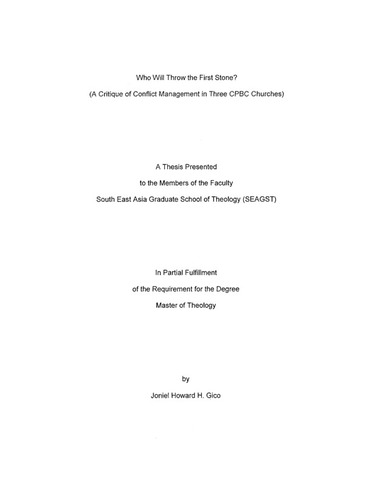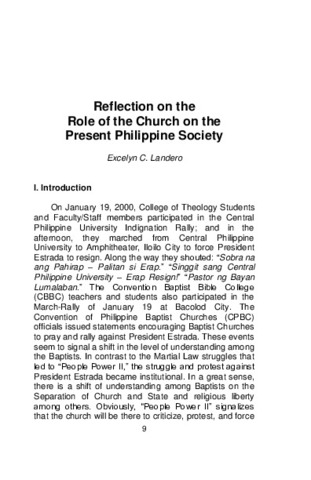Показать сокращенную информацию
Who will throw the first stone? (A critique of conflict management in three CPBC churches)
| dc.contributor.author | Gico, Joniel Howard H. | |
| dc.date.accessioned | 2022-05-30T01:18:47Z | |
| dc.date.available | 2022-05-30T01:18:47Z | |
| dc.date.issued | 2003 | |
| dc.identifier.citation | Gico, J. H. H. (2003). Who will throw the first stone? (A critique of conflict management in three CPBC churches) (Unpublished Master’s thesis). South East Asia Graduate School of Theology (SEAGST), Quezon City. | en_US |
| dc.identifier.uri | https://hdl.handle.net/20.500.12852/2068 | |
| dc.description | Abstract only | en_US |
| dc.description.abstract | Conflict has been the growing phenomenon that plagues many of the local churches of the Convention of Philippine Baptist Churches, Inc. In a way, conflict is no respecter of persons and organizations. It has destroyed friendships that had been established for years and have split small and big churches that have great potentials for growth. It has become a nightmare to many pastors and lay leaders especially because of its many traumatic effects. But conflict is not all a negative thing; it has been shown that if managed properly, it could propel churches to tremendous growth and greater heights of service. But this is where the problem lies. Many of our denominational leaders and pastors are at a loss when called to respond to conflict situations because they have no workable grasp of its nature and are not aware of the available strategies and tools to manage it. Much more, it is also very important that one should first be clear of his theology of conflict in order to be consistent in the use of whatever available strategies and styles of conflict management. The cases of three Baptist churches in conflict would serve as a test as to how ready we are to meet the challenges of separation and disunity. It should be assumed to some extent that these three cases would serve as a cross-section of the CPBC churches in the barrios, towns and cities. The analysis and interpretation of these cases set in perspective the key pastoral theological issue to be dealt with. Some selected concepts of Karl Marx and Carl Jung integrated in the conflict theories they propounded were used to further give light to the conflict situations. But at the same time, Marx’s and Jung’s positions were also evaluated to see their strengths and weaknesses and the extent to which their concepts could be adopted. Other studies by several experts in conflict management are also acknowledged in this paper with the idea of contextualizing their observations to make it applicable in our particular situation. Several of them would be very helpful in understanding the anatomy of conflict. Many of the suggestions would be very handy to pastors who would be interested in doing the work of mediation. As an offshoot to this study, it has been highly recommended to reinterpret the Baptist distinctive on local church autonomy, which in many cases has served as a blockade to serious concern and mediation. The need to establish a local church committee to deal with disputes that might aggravate the conflict is being encouraged. Levels of intervention and mediation are also identified to encourage participation and to exhaust all possibilities for resolution. But above all, the need for training of core leaders is being emphasized so that our local churches and denominational leadership will not be caught flat-footed when such a situation appears in the picture. Strategies and techniques however should be matched with right motivation and in this case, the love of God and the model of Jesus are of great importance. The role of prayer should not be underestimated in this particular case for it does not only speak of unity and participation but also an acknowledgment that we have a great God who will intervene when everything is beyond control. In all of these, the need to develop a basic foundation/framework in settling and managing conflict is essentially necessary to help us become more realistic about our churches. We are still neophytes in the field of conflict management. But it is the author’s hope that the attempt made in this thesis would serve as a springboard for future deeper study and assessment of our strengths and limitations. Pursuing such road would help us discover the possible opportunities to develop our approaches in the context and culture we are in. | en_US |
| dc.description.sponsorship | Convention Baptist Bible College | en_US |
| dc.format.extent | 191 leaves | en_US |
| dc.language.iso | en | en_US |
| dc.subject.ddc | TheoLib Thesis 200.72 G359 | en_US |
| dc.subject.lcsh | Church controversies--Baptists | en_US |
| dc.subject.lcsh | Church controversies | en_US |
| dc.subject.lcsh | Conflict management--Religious aspects--Christianity | en_US |
| dc.subject.lcsh | Baptists | en_US |
| dc.subject.lcsh | Case studies | en_US |
| dc.subject.lcsh | Church controversies--Case studies | en_US |
| dc.subject.lcsh | Conflict management | en_US |
| dc.title | Who will throw the first stone? (A critique of conflict management in three CPBC churches) | en_US |
| dc.title.alternative | Who will throw the first stone? (A critique of conflict management in three Convention of Philippine Baptist churches) | en_US |
| dc.type | Thesis | en_US |
| dcterms.accessRights | Not publicly accessible | en_US |
| dc.description.bibliographicalreferences | Includes bibliographical references | en_US |
| dc.contributor.department | Theology | en_US |
| dc.description.degree | Master of Theology | en_US |
| local.subject | Convention of Philippine Baptist Churches (CPBC) | en_US |
Файлы в этом документе
Данный элемент включен в следующие коллекции
-
Theses [9]





